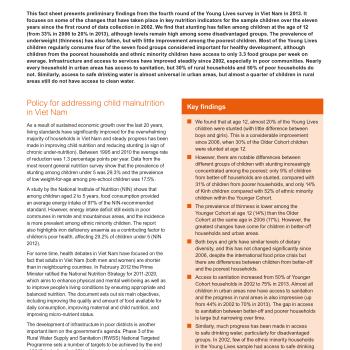Publication Information

This fact sheet presents preliminary findings from the fourth round of the Young Lives survey in Viet Nam in 2013. It focuses on some of the changes that have taken place in key nutrition indicators for the sample children over the eleven years since the first round of data collection in 2002. We find that stunting has fallen among children at the age of 12 (from 33% in 2006 to 20% in 2013), although levels remain high among some disadvantaged groups. The prevalence of underweight (thinness) has also fallen, but with little improvement among the poorest children. Most of the Young Lives children regularly consume four of the seven food groups considered important for healthy development, although children from the poorest households and ethnic minority children have access to only 3.3 food groups per week on average. Infrastructure and access to services have improved steadily since 2002, especially in poor communities. Nearly every household in urban areas has access to sanitation, but 30% of rural households and 50% of poor households do not. Similarly, access to safe drinking water is almost universal in urban areas, but almost a quarter of children in rural areas still do not have access to clean water.

This fact sheet presents preliminary findings from the fourth round of the Young Lives survey in Viet Nam in 2013. It focuses on some of the changes that have taken place in key nutrition indicators for the sample children over the eleven years since the first round of data collection in 2002. We find that stunting has fallen among children at the age of 12 (from 33% in 2006 to 20% in 2013), although levels remain high among some disadvantaged groups. The prevalence of underweight (thinness) has also fallen, but with little improvement among the poorest children. Most of the Young Lives children regularly consume four of the seven food groups considered important for healthy development, although children from the poorest households and ethnic minority children have access to only 3.3 food groups per week on average. Infrastructure and access to services have improved steadily since 2002, especially in poor communities. Nearly every household in urban areas has access to sanitation, but 30% of rural households and 50% of poor households do not. Similarly, access to safe drinking water is almost universal in urban areas, but almost a quarter of children in rural areas still do not have access to clean water.

